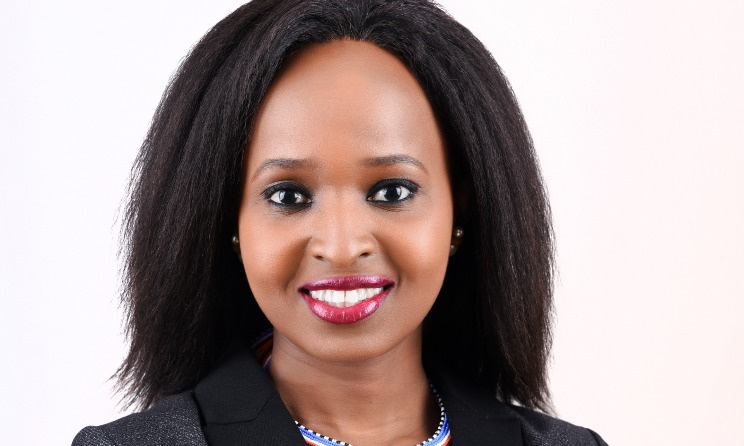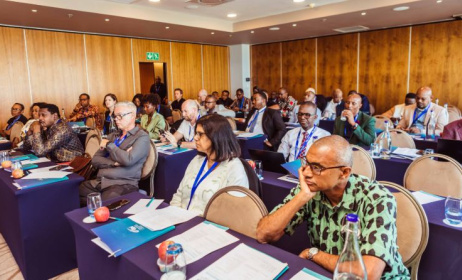IFPI's Angela Ndambuki: African music industry is very promising
Angela Ndambuki spearheads the International Federation of the Phonographic Industry (IFPI) in sub-Saharan Africa. She works closely with her team in Nairobi, Kenya, to champion issues affecting the local recording industry and to support the development of the music market in the 46 countries she is responsible for.
 IFPI regional director for sub-Saharan Africa Angela Ndambuki.
IFPI regional director for sub-Saharan Africa Angela Ndambuki.
Ndambuki has extensive experience in leadership and strategic decision making. She holds a master's degree in intellectual property law from the University of Edinburgh, and is an expert at the World Intellectual Property Organisation (WIPO) Academy. In 2018, she was recognised as one of the 100 Most Reputable Africans by Reputation Poll, for her various roles in advancing corporate governance, and intellectual and human rights interests.
IFPI has represented the music business globally since 1933, and with the recently launched sub-Saharan office in Nairobi, the organisation has embarked on a drive to improve awareness of its services and to bolster the intellectual property space on the continent. Over the next year, Ndambuki and her team plan to deepen their relationship with record labels and collective management organisations.
"We believe that sensitisation is critical in all aspects and we will not stop at artists and labels," she told Music In Africa. "We have already begun a series of webinars to sensitise music licensing on various operational issues, including effective licensing and distribution. We will work with the major companies and other partners to drive targeted sensitisation campaigns on various issues affecting the recording industry."
Sub-Saharan Africa has historically received less interest as a music market from international players. However, with the African music industry showing greater potential every year, more investments are coming in from across the globe: the big three labels and their imprints are launching reginal offices throughout the continent, and digital service providers are seeing more value in making their services available in more countries.
"The sub-Saharan Africa recording industry is very promising," Ndambuki says. "The market is developing albeit at a slow pace and varying levels from country to country. The industry holds a big opportunity for growth, especially with online users, seeing that it holds a population of more than 1 billion – a potential market to tap into."
Before her recent appointment, Ndambuki consulted for IFPI for a number of years. She helped the expansion of the organisation's presence in the region and identified areas of concern, which if addressed could set the foundations to support the industry's long-term development.
"Indeed several challenges are affecting the industry such as issues of policy, licensing and content protection. But this is a real indication of the need to have an office that will serve these very needs and obtain market information that will inform strategies put in place to grow the industry. While there are differences between the levels of development of the markets, what's common is the impressive wealth of talent throughout the region."
IFPI will offer direct training in intellectual property law with local partners and develop and implement structures to accelerate growth and development. "That's something I feel very passionate about," Ndambuki says.
IFPI said in June that recorded music revenue in Africa and the Middle East grew by 15.9% to $101m in 2019. Ndambuki says for these figures to keep growing, labels and distributors need to have access to the right tools in order to track recordings and manage copyrights. She says policy is at the core of a successful copyright ecosystem: "Copyright laws must be clear and provide certainty on how music can be used legally. The investment in the region would increase if the environment for investing in intangible, copyright-protected content were to improve further."
IFPI's planned approach for intellectual property enforcement in the region is to tackle illegal services and the people behind them. The organisation wants to ensure that companies make music available through legal means, including licensing their extensive catalogues to streaming services. Ndambuki is confident that IFPI can work with local partners to create a more balanced copyright space, in line with the current commercial realities.
"We need the support from governments to create the right environment to enable music to be licensed and for record companies to be able to enforce their rights. For sub-Saharan Africa, we are currently analysing the various legal frameworks to ensure they are favourable to the rightsholders and that the laws are not taken advantage of to the detriment of rightsholders. We shall, therefore, work hand in hand with government agencies to provide support in content protection and enforcement, especially in emerging technologies. We need adequate tools to tackle illegal services that seek to exploit the work of artists and profit through large-scale copyright infringement."
Ndambuki says the new office will also provide International Standard Recording Codes (ISRCs), which IFPI previously assigned from its head office in London. The digital space, and streaming in particular, has created global supply chains, but taking advantage of worldwide distribution opportunities involves the management of repertoire and rights data, and the cornerstone of this is the ability to identify and track recordings using ISRCs.
"Alongside copyright is the ability to manage recordings and rights," Ndambuki says. "This means databases, identifiers and data exchange standards. It’s all the better if these things can be done locally, so that local businesses and local creators can take control. We are always looking at ways to work with local entities to provide better-localised support for the ISRC. This can be in the form of ISRC managers, which are typically digital distributors and also at working with recording industry bodies and music licensing companies."
Ndambuki is presently working on getting buy-in from local entities to create national groups that will represent the recording industry in each of the 46 countries. "The rapid developments we see in many African countries are exciting, and we do expect huge steps forward over the next year or two," she says.






























Comments
Log in or register to post comments